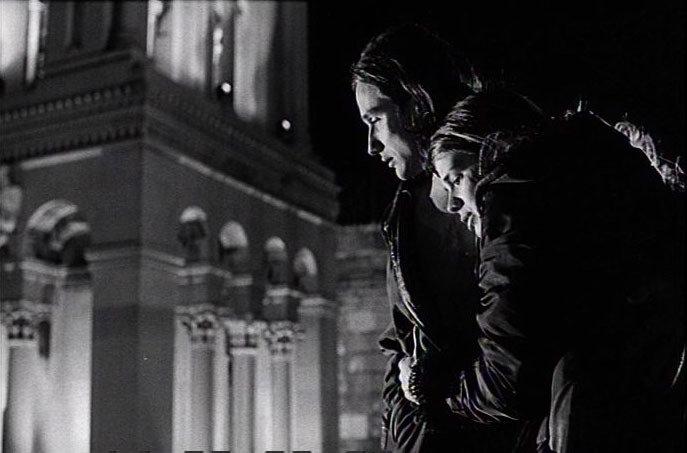A Wonderful Night in Split/Ta divna splitska noć (Arsen Anton Ostojić, 2004, Croatia)
Common stories, common relationship between a city and its people, common characters – and yet, everything depicted in an exceptional way.
Ironically set on New Year’s Eve, in Split, Croatia, this black and white movie tells us three well associated stories. The first story follows a woman, her lover and her child, as the lover is about to leave for drug dealing job. The second is about a teenage girl hooking up with a foreign sailor to get drugs. The third is about a young couple trying to find a place to have sex and do drugs. These stories are fused trough the presence of a drug dealer called Crni and The Singer, also a junkie, who appears as a grotesque master of ceremony.
In contrast to the “carnival” environment, our protagonists are trapped in a claustrophobic atmosphere, as they move through the narrow streets, dark rooms and a crowded square. Vertiginous cinematography with kinesthetic qualities enhances this feeling of tightness. Low lighting, worthy of comparison with the best noir movies, perfectly rounds up the whole impression. Claustrophobic feeling emerges from the story itself, from tight relationships between the characters. Trapped in the post-war dystopia, they are defined by their past and the lack of hope for their future. In such constellation, drugs are their mean of keeping an illusion of normal life.
However, normal life and joy are impossible for them, even though everyone else is celebrating. Their time passes wrapped in unpleasant emotions. Sex scenes are among the most unpleasant and the most effective ones. When sex, as the source of life and joy, doesn’t work in a society, you know that something is definitely wrong. One of the first scenes depicts passionate and violent sexual act between a woman and her lover in the kitchen. They don’t stop when she needs to take care of cooking. The scene is made even more unpleasant by the presence of the woman’s son. It is spiced up with morbid humor, but it also gives us a serious picture of a woman’s position in patriarchal society. Characters’ troubles do emerge from war and socio-political factors, but knowledge of recent Croatian history is not essential, as the movie speaks for itself through these subtle ways.
What thrills the most is the author’s amazingly benevolent attitude towards his characters. In the third story, a young junkie has a liberation through drugs – he becomes an angel. After showing the negative side of Split’s society, the author shows great understanding of its misery.
This movie has some flaws, most of them regarding some unusually arranged elements of the script. However, those tiny flaws haven’t damaged the overall quality of the movie too much. Instead of focusing on those ‘mistakes’, focusing on its strengths is much more important, as they really stand out in terms of Balkan cinema. Amazing photography, cinematography that makes us feel dizzy, precise and dynamic editing, catchy and appropriate score – it all complements a great story. For more than an hour and a half, we are trapped with the protagonists, finally to be liberated with the angel. Liberated, with many things to think about.

